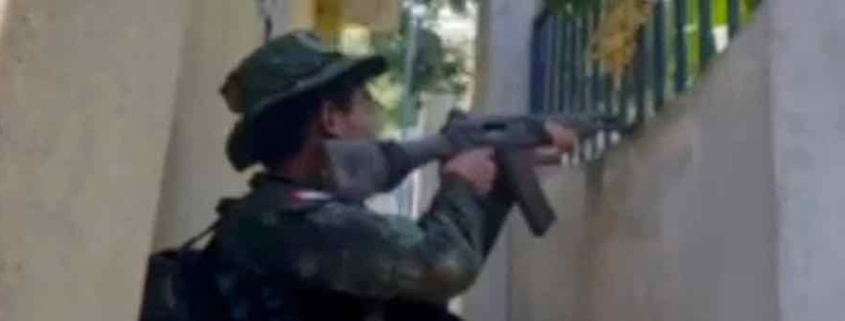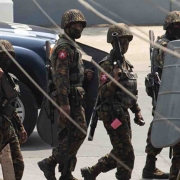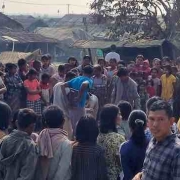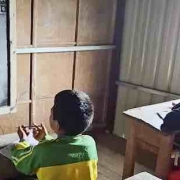Karenni officials: 200 university workers are safe after evacuation
Myanmar’s junta alleges the teachers and staff members were being detained after recent fighting.
More than 200 civilians evacuated from a university during recent fighting in the Kayah state capital in eastern Myanmar are being provided health care at a safe location, Karenni officials told Radio Free Asia.
The military junta has alleged that the civilians, which include teachers and the rector from Loikaw University, were being detained against their will.
“Some of them seem to be in a good mood, but some others said they are missing their family members,” said Banyar, the director of the Karenni Human Rights Organization. “We have told them that we will proceed in accordance with rules and regulations.”
Fighting began in Loikaw in eastern Myanmar on Nov. 11 when the Karenni Nationalities Defense Force, or KNDF, targeted junta bases and a prison in the city. Junta troops retaliated with airstrikes and shelling, killing 20 civilians, according to the Karenni Human Rights Organization.
The KNDF announced on Nov. 15 that they had successfully occupied the university, where two battalions of military junta soldiers had been stationed. The soldiers had frequently raided and shelled nearby villages, according to KNDF Chairman Khun Bedu.
Regime spokesperson Maj. Gen. Zaw Min Tun said the attack on Loikaw University was a “barbaric act” and alleged that Karenni troops had killed some teachers and taken other teachers hostage.
Khun Bedu denied these accusations, saying the attack was carried out only because soldiers were stationed there.

A Karenni National Progressive Party official told RFA that junta troops used some university staff members and students as human shields during the fighting. They were evacuated to a secure place and no one has been tortured or killed, he said.
“We are working to allow them to go to their destinations safely,” he said. “We are not using them as human shields like the military did.”
On Monday, the KNDP published a recorded video clip on its social media page with statements from the university’s rector and several teachers.
Some of the university staff members were being questioned about possible junta associations, said Banyar, who goes by one name. Legal action may be taken against some of them, he said on Monday. He did not provide specific details.
Artillery attacks and air strikes
Karenni forces launched their offensive this month after their northern allies’ “Operation 1027,” during which rebel groups won control of three major cities in Shan state.
The Karenni Humanitarian Aid Initiative on Tuesday said air strikes and artillery attacks killed 68 civilians between Nov. 11-19 in Loikaw and Shan’s Pekon township. Victims included 10 children and 18 women, the group said.
The information was gathered from the Karenni Human Rights Organization and media reports, they said.
A humanitarian volunteer for Karenni displaced persons told RFA that the actual casualty toll may be higher.
“We cannot get some figures from the frontlines of battles,” the volunteer said. “As the military was being defeated in the battles, they carried out air strikes on civilian targets and shot people dead.”
RFA attempted to contact Myint Kyi, junta spokesperson for Kayah state, but phone calls went unanswered.

Neither the junta nor Kareni forces have stated total casualty tolls from the fighting that began on Nov. 11.
Elsewhere in Myanmar, a People’s Defense Force in Chin state said they have occupied a military outpost at Kennedy Peak between Kalay and Tedim townships.
About 30 junta soldiers had been stationed at the outpost since the February 2021 military coup.
“We began to attack this outpost at 4 a.m., and totally controlled the camp at around 6 a.m.,” an official from PDF Zoland told RFA. “It was the highest mountain in northern Chin and strategically important. So we captured it.”
RFA attempted to contact Kyaw Soe Win, the social affairs minister and junta spokesperson for Chin state government, for his response but was unable to reach him.







